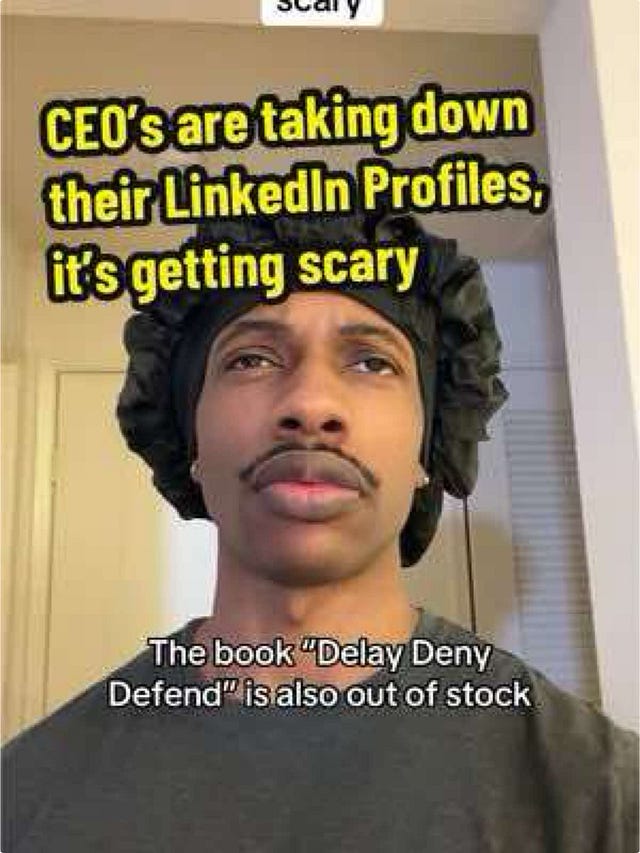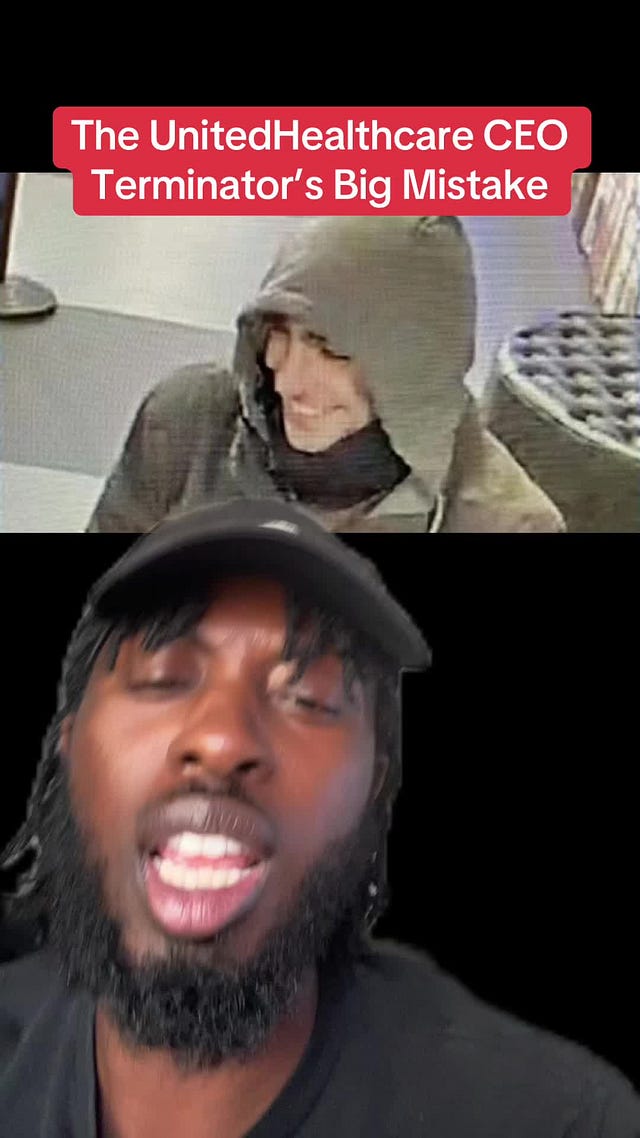A Watershed Moment in Class Consciousness?
An Assassination, TikTok, and the Spectacle of Authority
The recent assassination of UnitedHealthCare CEO Brian Thompson has sent shockwaves through American society, sparking a multifaceted conversation that transcends the traditional left-versus-right political divide. Instead, it has highlighted the stark realities of wealth inequality and class dynamics, offering a rare moment of collective reflection on authority, justice, and economic power.
 Tiktok failed to load.
Tiktok failed to load.Enable 3rd party cookies or use another browser
The Shift to a Class Narrative
For decades, American discourse has been framed by cultural and partisan divides, leaving little room for robust discussions of class consciousness. However, the reaction to Thompson's death, particularly on social media platforms like TikTok and X (formerly Twitter), reveals a growing awareness of systemic inequalities. Across ideological lines, users have united in their frustrations over exploitative healthcare practices, ballooning costs, and the role of corporate authority in everyday life.
The metaphorical framing of this event, to borrow from George Lakoff’s theories on cognitive linguistics, is pivotal. The inscribed bullets found at the crime scene—"deny," "defend," and "depose"—serve as a darkly poetic indictment of insurance industry practices. Lakoff emphasizes that metaphors shape how people conceptualize complex systems, and in this case, the bullets have become a visceral symbol of systemic oppression.
These frames resonate because they tap into a deeply felt, though often suppressed, resentment against corporate authority. They redirect the narrative away from personal morality and toward systemic critique, aligning public discourse with broader critiques of economic inequality.
TikTok as a Catalyst for Dialogue
TikTok has emerged as a crucial space for disseminating and reframing this moment. Videos dissecting the healthcare industry’s exploitative practices, as well as the inequalities that underpin it, have gone viral. Creators from diverse backgrounds—workers, students, and even former healthcare executives—are leveraging the platform's storytelling tools to amplify critiques of corporate power.
Ironically, this surge of class-conscious discourse on TikTok comes at a moment when the app faces existential threats in the U.S. Recent court decisions affirming its impending ban have added urgency to these conversations. If TikTok’s ability to act as a counter-hegemonic tool is curtailed, the avenues for organizing and amplifying dissent could be severely limited.
The "Good-Looking" Suspect and the Spectacle of Authority
As the NYPD released an updated photo of the suspect, a new dimension of public fascination emerged. Social media has latched onto the image, with users describing the individual as "good-looking" and launching viral lookalike contests. This bizarre turn has further complicated the narrative, blending genuine class outrage with the internet’s penchant for spectacle.
 Tiktok failed to load.
Tiktok failed to load.Enable 3rd party cookies or use another browser
The glorification of the suspect reflects a larger ambivalence about authority. The act of assassination is widely condemned, but the suspect’s symbolic defiance against a system perceived as unjust has made him, paradoxically, an anti-hero to some. This mirrors historical moments where discontent with systemic inequities has elevated individuals to folk-hero status, even when their actions are ethically fraught.
Authority in Flux
This moment represents a critical juncture in the ongoing renegotiation of authority in American society. The reaction to Thompson's death underscores that authority is no longer accepted as an inherent right but is increasingly contingent on public perception and trust. Corporations, long seen as untouchable arbiters of power, are facing a crisis of legitimacy.
For the first time in decades, Americans appear to be coalescing around the understanding that their struggles are rooted not in partisan politics but in economic structures. This newfound class consciousness, amplified by the metaphors and narratives emerging from this tragedy, could reshape the discourse around authority for years to come.
 Tiktok failed to load.
Tiktok failed to load.Enable 3rd party cookies or use another browser







The Monopoly money in the abandoned backpack was 👌
Don't shoot the CEOs is just a principal like peaceful transition of power (and
"don't prosecute a sitting president.")
Electors are like children - do not so much what they are told as what they are shown.
Beware dismissing principles in the open.